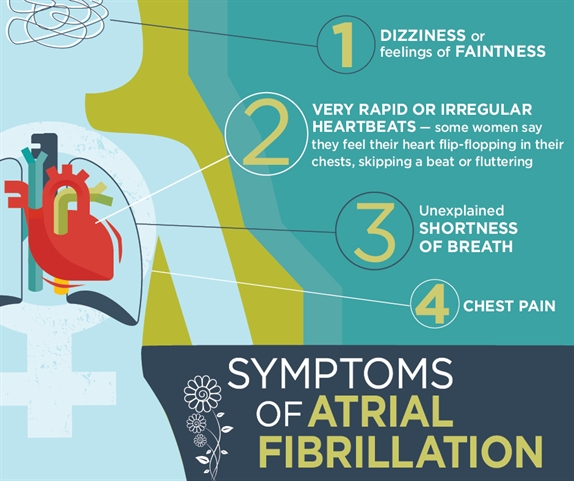 Know Atrial fibrillation
Know Atrial fibrillation
 A blood clot that forms as a result of AFib is an example of arterial thromboembolism. If that clot breaks free, it can lodge in an artery, travel to the brain and result in a stroke.
A blood clot that forms as a result of AFib is an example of arterial thromboembolism. If that clot breaks free, it can lodge in an artery, travel to the brain and result in a stroke.
Risk Factors for afib
- Congestive heart failure
- High blood pressure
- Age of 65 or older
- Diabetes
- Stroke (prior), TIA, or thromboembolism
- Vascular disease
- Sex category (female > risk)
Take Action
- Talk with a healthcare professional about AFib and ask to have your pulse checked for an irregular heartbeat.
- If you are a healthcare professional, take initiative and evaluate your patients for AFib/arrhythmia risk.
* Based on the CHA2DS2VASc prediction score which estimates risk of stroke in patients with AFib
AFib Resources
Atrial Fibrillation Association
Offers a suite of patient and provider resources about AFib through multiple consumer education campaigns, including AF Aware Week and Know Your Pulse.
Act Against AFib
Encourages patients to 'ACT' against AFib by: Assessing risk, consulting a doctor, and treating their AFib. Posters, palm cards and videos reinforce the ACT model.
American College of Physicians
This 'What You and Your Family Should Know' booklet provides helpful information about AFib, including risk factors, blood clot prevention, and questions to ask your healthcare professional.
American Heart Association
The AFibFive is a comprehensive e-zine developed to help adults with AFib understand their diagnosis and learn how to lead a healthy life. The resource includes videos, audio instructions and an interactive quiz.
European Society of Cardiology (ESC)
ESC created Afibmatters.org, an educational website designed by health professionals and patients for people suffering from AFib, as well as their families and caregivers. The site offers information about proper detection and management of AFib.
Global Atrial Fibrillation Alliance
Provides tools, resources and news to help patients around the world talk with healthcare providers about the treatment and management of AFib. The Alliance also hosts World AF Day, which occurs annually on the second Saturday of September.
Heart Rhythm Society
The Society's Atrial Fibrillation Awareness webpage provides educational resources for patients and providers about AFib, including symptoms and risk factors.
National Blood Clot Alliance
The Alliance's AFib webpage provides an overview of AFib-related blood clots and clot-provoked stroke.
National Heart, Lung, and Blood Institute
A detailed overview of AFib, including an animated video of irregular heartbeat and the impact on the rest of the body.
Preventive Cardiovascular Nurses Association
Educational information for adults with AFib, including detection tests, symptoms, and instructions on how to conduct a self-pulse test.
Sign Against Stroke
A global patient charter to make AF-related stroke prevention a priority and to create a unified voice to improve the care and treatment of individuals with AFib.
Society of Cardiovascular Patient Care
Resources for healthcare professionals, hospitals and health systems, including a pocket guide for the evaluation and management of AFib patients, articles and abstracts, and guidelines and recommendations.
Stop Afib
The latest news and resources about AFib, including treatment and management options, and caregiver tools. Includes an international listing of AFib services.
Stroke Association
Offers a resource library on stroke and stroke-related issues, including AFib. Leaflets, factsheets and FAQs are available for download.
WebMD
An Atrial Fibrillation Health Center offers tools and resources for adults with AFib, including the causes, symptoms, procedures and treatment options and helpful lifestyle changes.
World Stroke Organization
World Stroke Organization established a Global Atrial Fibrillation Patient Charter, designed to bring a worldwide, unified voice to improving the care and treatment of AFib. The charter contains recommendations for policymakers, healthcare providers and governments.
World Heart Federation
The Global AF Action campaign is dedicated to increasing recognition for AFib as a major international public health concern. Provides steps to conduct a do-it-yourself pulse test and multi-language care resources.
12 Wolf PA, Abbott RD, Kannel WB. Atrial fibrillation: a major contributor to stroke in the elderly. The Framingham Study. Arch Intern Med 1987;147:1561-4.
13 Kannel WB, Benjamin EJ. Status of the epidemiology of atrial fibrillation. Med Clin North Am 2008;92:17-40.
14 Paciaroni M, Agnelli G, Caso V, et al. Atrial fibrillation in patients with first-ever stroke: frequency, antithrombotic treatment before the event and effect on clinical outcome. J Thromb Haemost 2005;3(6):1218-23. PMID: 15892862.
